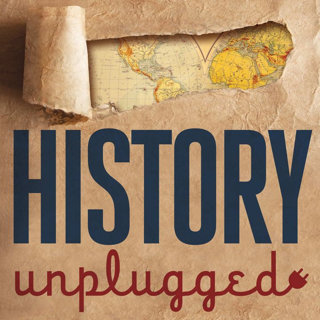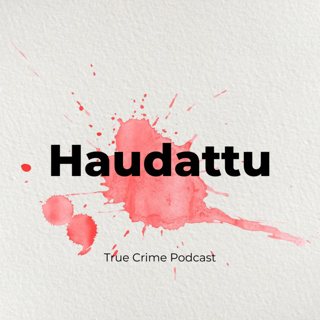
The Hatfield-McCoy Feud Started Over a Pig and Nearly Escalated Into a Regional War
The origins of the Hatfield-McCoy conflict (between the Hatfield family of West Virginia, led by William Anderson "Devil Anse" Hatfield, and the McCoy family of Kentucky, led by Randolph "Old Randall" McCoy) begins with a dispute over a pig. From here, it escalated from minor disagreements to violent encounters that spanned decades, nearly sparking a war between the two states. Today’s guest is Jennifer Bennie, host of the Walk With History podcast. We look at the historical context of the feud, its escalation from minor disputes to violent encounters, and its significance in American folklore. See omnystudio.com/listener for privacy information.
17 Huhti 45min

The 1845 Potato Blight Struck Across Northern Europe. Why Did Only Ireland Starve?
In 1845, a novel pathogen attacked potato fields across Europe, from Spain to Scandinavia—but only in Ireland were the effects apocalyptic. At least one million Irish people died, and millions more scattered across the globe, emigrating to new countries and continents. Less than fifty years after the union of Ireland with the rest of Great Britain, the newly formed United Kingdom—the most powerful country in the nineteenth-century world—failed millions of its own citizens, leading to decades of poverty, ecological ruin, and collective trauma. How did this happen? Today’s guest Padraic Scanlan recontextualizes the disaster’s origins, events, and consequences in his new book “Rot: An Imperial History of the Irish Famine.” We situate the Irish Great Famine in a larger history of economic consolidation and exploitation caused by British policies toward Ireland. The blight that decimated the potato plants was biological, but the Famine itself was manmade, caused by the British government’s structures of land ownership, labor, and rent collection. The real tragedy of the Famine wasn’t that the British maliciously intended and propagated starvation, but that their efforts to address the “Irish Question” only exacerbated the problem.See omnystudio.com/listener for privacy information.
15 Huhti 48min

A Simple Tennessee Preacher Transformed Abolitionism from a Deeply Unpopular Radical Movement to a Centrist Cause
Sitting high above the small community of Ripley, Ohio, a lantern shone in the front window of a small, red brick home at night. It was a signal to slaves just across the Ohio River. Anyone fleeing bondage could look to Reverend John Rankin’s home for hope. To the slaveholders they fled from, Rankin’s activities as a “conductor” on the Underground Railroad invoked rage. Mobs often pelted Rankin with eggs and rocks, bounties were placed on his head, and midnight assassins lurked in the darkness, waiting for the right opportunity to take out the “Father of Abolitionism.” Despite frequent threats, he remained committed to the freedom of his fellow man.Today’s guest is Caleb Franz, author of The Conductor: The Story of Rev. John Rankin, Abolitionism's Essential Founding Father, we look at the story of the man who served as a George Washington–type figure to the antislavery movement. Rankin’s leadership brought unity and clarity to the often factious abolitionists of the nineteenth century. William Lloyd Garrison, Harriet Beecher Stowe, and countless others found inspiration in his teachings. He also presented abolitionism as a moderate movement, helping to make it palpable to Southern centrists who considered most abolitionists Yankee radicals who wanted to watch America descend into a Haitian-style race war.See omnystudio.com/listener for privacy information.
10 Huhti 51min

How Benjamin Franklin’s Stove Invention Kept Early America From Freezing
The biggest revolution in Benjamin Franklin’s lifetime was made to fit in a fireplace. Assembled from iron plates like a piece of flatpack furniture, the Franklin stove became one of the era's most iconic consumer products, spreading from Pennsylvania to England, Italy, and beyond. It was more than just a material object, however—it was also a hypothesis. Franklin was proposing that, armed with science, he could invent his way out of a climate crisis: a period of global cooling known as the Little Ice Age, when unusually bitter winters sometimes brought life to a standstill. He believed that his stove could provide snug indoor comfort despite another, related crisis: a shortage of wood caused by widespread deforestation. And he conceived of his invention as equal parts appliance and scientific instrument—a device that, by modifying how heat and air moved through indoor spaces, might reveal the workings of the atmosphere outside and explain why it seemed to be changing. Today’s guest is Joyce Chaplin, author of The Franklin Stove: An Unintended American Revolution, the story of this singular invention, and a revelatory new look at the Founding Father we thought we knew. We follow Franklin as he promotes his stove in Britain and France, while corresponding with the various experimenters who discovered the key gases in Earth's atmosphere, invented steam engines, and tried to clean up sooty urban air. During his travels back and forth across the Atlantic, we witness him taking measurements of the gulf stream and observing the cooling effect of volcanic ash from Iceland. And back in Philadelphia, we watch him hawk his invention while sparring with proponents of the popular theory that clearcutting forests would lead to warmer winters by reducing the amount of shade cover on the surface of the Earth.See omnystudio.com/listener for privacy information.
8 Huhti 41min

Roman Churches Had No Involvement in Marriage. How Did It Become a Holy Sacrament by the Middle Ages?
For much of Christian history, the Church had little involvement in marriage, which was primarily a contract between families. It wasn’t until the fourth century that church weddings emerged, and even then, they were mostly reserved for the elite. Fast forward to the High Middle Ages, and marriage became a sacrament of the Roman Catholic Church. Since then, the church has been seen as inseparable with matrimony. What changed over the centuries? To explore this dynamic is today’s guest, historian Diarmaid MacCulloch, author of “Lower Than the Angels: A History of Sex and Christianity.” We explore how Christianity’s views on sex, marriage, and gender evolved over time; that early Christian marriage was not a universal sacrament but a social institution governed by authority figures. He highlights how for much of history, the Church was more concerned with celibacy than marital sexuality. The Reformation reshaped these ideas, introducing new roles for women in religious life, from pastor’s wives to Quaker preachers. We uncover how Christianity’s past can inform its present and future.See omnystudio.com/listener for privacy information.
3 Huhti 38min

How a Mess Cook Saved Dozens of Sailors from Shark Infested Waters Off the Coast of Guadalcanal
On the night of September 5, 1942, the USS Gregory (APD-3), a converted destroyer turned high-speed transport, was caught in a deadly ambush near Guadalcanal. The ship had been supporting U.S. Marine forces, ferrying troops and supplies, when it was mistaken for a larger threat by a group of Japanese destroyers. Outgunned and unable to escape, Gregory was hammered by shellfire, set ablaze, and ultimately sank in Ironbottom Sound. Lieutenant Commander Harry F. Bauer, refusing to abandon his men, fought to the end and was posthumously awarded the Navy Cross. As the surviving crew struggled in the water, Mess Attendant Charles J. French emerged as an unlikely hero, tying a rope around his waist and towing wounded shipmates for hours through shark-infested waters to safety. Against overwhelming odds, he kept them together until they were finally rescued. Join us as we uncover this harrowing tale of sacrifice, heroism, and the unbreakable spirit of the USS Gregory’s crew. To discuss this story is today’s guest Carole Avriett, author of “Midnight in Ironbottom Sound: The Harrowing WWII Story of Heroism in the Shark-Infested Waters of Guadalcanal.”See omnystudio.com/listener for privacy information.
1 Huhti 28min

Humanity’s Past Suggests We Only Have 10,000 Years to Change or Go Extinct
We are living through a period that is unique in human history. For the first time in more than ten thousand years, the rate of human population growth is slowing down. In the middle of this century population growth will stop, and the number of people on Earth will start to decline - fast.As Gee demonstrates, our population has peaked, and is declining; our environment is becoming inimical to human life in many locations; our core resources of water, arable land, and air are diminishing; and new diseases, simmering conflicts, and ambiguous technologies threaten our collective health. Can we still change our course? Or is our own extinction inevitable?There could be a way out, but the launch window is narrow.Unless Homo sapiens establishes successful colonies in space within the next two centuries, our species is likely to stay earthbound and will have vanished entirely within another ten thousand years, bringing the seven-million-year story of the human lineage to an end. To look at our escape options, we are joined by Henry Gee, author of “The Decline and Fall of the Human Empire.” He envisions new opportunities for the future of humanity—a future that will reward facing challenges with ingenuity, foresight, and cooperation.See omnystudio.com/listener for privacy information.
27 Maalis 53min

The 16th Century Ottomans Nearly Conquered Europe. Why Did European Kingdoms Make So Many Alliances With Them?
The determined attempt to thwart Ottoman dominance was fought by Muslims and Christians across five theaters from the Balkans to the Mediterranean and the Indian Ocean, from Persia to Russia. But this is not merely the story of a clash of civilizations between East and West. Europe was not united against the Turks; the scandal of the age was the alliance between King Francis I of France and Sultan Suleiman the Magnificent. Meanwhile, the resistance of the Saadi dynasty of Morocco to Ottoman encroachment played a critical role in denying Constantinople direct access to the Atlantic Ocean. By the same token, though religious imperatives were critic al to the motivations of all the key actors involved, these in no way fell neatly along the Christian Muslim divide. The Holy Roman Emperor Charles V desired nothing more than to eradicate the Protestant heresy metastasizing throughout his domains, but the threat of Turkish invasion forced him to stay his hand and indulge his Lutheran subjects to ensure a common defense. Nevertheless, the collective effort to constrain the expansion of the Ottoman superpower did succeed with the ultimate victory in 1571 the tipping point in reordering the trajectory of history. To explore these facets of medieval and early modern European history is today’s guest, Si Sheppard, author of “Crescent Dawn: The Rise of the Ottoman Empire and the Making of the Modern Age.” See omnystudio.com/listener for privacy information.
25 Maalis 51min






















